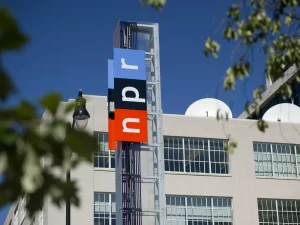When National Public Radio whistleblower Uri Berliner penned an essay recently in the online news site “The Free Press,” criticizing the radio station’s leftist partisanship, many in the world of broadcast journalism seemed shocked.
Not me.
For the past two decades, I have watched NPR slide further and further into the socialist bog. The skid to the left began in earnest during the George W. Bush presidency and turned into a full-blown leftist avalanche during Donald Trump’s presidency. I can’t recall one positive or neutral story that NPR broadcast about President Trump during his tenure in Washington.
I have a fairly intimate knowledge of NPR. In the late 1990s, as a senior writer at the Chicago Tribune, I was a commentator on World View, a weekly news/information show produced by WBEZ, NPR’s Chicago affiliate.
Later, when I was the Dean of the College of Media at the University of Illinois, PBS and NPR’s local affiliate, WILL-AM-FM-TV-Internet, was a unit of my College, along with the Departments of Journalism, Advertising, Cinema, and Media Studies and the Institute of Communications Research.
During that time (2003-2010) we strived to keep NPR’s local news coverage impartial and our talk radio shows as balanced as possible. As Dean, I often guest-hosted our local talk radio shows and interacted with callers from as far away as Chicago to the north and St. Louis to the south.
The conversations sometimes got animated and even a bit fiery, but everybody got to talk no matter where they were on the political spectrum. We never censored speech and were proud to provide a forum for opinions from the left and the right.
I can’t say the same for the national feeds we got from NPR in Washington, Boston, and elsewhere.
Those were often slanted to the left, and some of our conservative listeners not only knew it, but they wrote letters to me about it.
I suspect the same happened at NPR’s national headquarters in Washington, D.C.
Perhaps that’s why Mr. Berliner decided to speak out.
In his essay, “I’ve Been at NPR for 25 years. Here’s How We Lost America’s Trust,” Berliner said that among editorial staff at NPR’s Washington, DC, headquarters, he counted 87 registered Democrats and no Republicans.

That’s 87 to 0. Democrats to Republicans. Liberals to conservatives. Socialists to capitalists.
As far as conservatives are concerned, that’s akin to getting hit in the head with a big can of leftist whoop ass.
Berliner wrote that he presented those disturbing findings to his colleagues during a May 2021 editorial staff meeting.
“When I suggested we had a diversity problem with a score of 87 Democrats and zero Republicans, the response wasn’t hostile,” Berliner wrote. “It was worse. They reacted with profound indifference.
“I got a few messages from surprised, curious colleagues,” he wrote. “But the messages were of the ‘oh wow, that’s weird’ variety as if the lopsided tally was a random anomaly rather than a critical failure of our diversity North Star.”
Berliner wasn’t some disgruntled underling at NPR. During his 25-year-long career, he was an award-winning business editor and reporter. So his criticism carried some weight, even if it was apparently ignored.
He accused his NPR bosses of allowing their pro-Democrat political leanings to seep into editorial judgments, including its decision to ignore the Hunter Biden laptop story, which first appeared in the New York Post and revealed emails that exposed Hunter Biden’s dubious business dealings overseas.

During the 2020 presidential campaign, 51 former top intelligence officials opposed to President Trump signed a letter claiming that the laptop story had “all the classic earmarks of a Russian information operation.”
However, independent investigators and the FBI later confirmed that the emails and the computer’s contents were authentic, confirming The Post’s reporting.
At NPR, there were crickets.
Not something NPR’s doyens wanted to hear.
So, just weeks before voters cast their ballots in the fall of 2020, senior editors at NPR decided to bury the Hunter Biden story because they feared reporting it would help Trump’s re-election chances.
It was a prime example of NPR’s bias of omission—something that it and much of the mainstream media often engage in when it comes to stories about Republicans and conservatives in general–and Donald Trump in particular.
Berliner wrote that NPR had tilted so far to the left that it played up Russia collusion allegations against Donald Trump while giving meager attention to the findings by special counsel Robert Mueller, who recommended no criminal charges against the Trump campaign.
“An open-minded spirit no longer exists within NPR, and now, predictably, we don’t have an audience that reflects America,” Berliner wrote. “A calculated emphasis on diversity and inclusion on the basis of race, ethnicity and sexual orientation, promoted by NPR’s former CEO, John Lansing, has fed the absence of viewpoint diversity.”
In his essay, Berliner described himself as “a Subaru-driving, Sarah Lawrence College graduate raised by a lesbian peace activist mother. As such, I fit the mold of a loyal NPR fan.”
A recent Pew Research Survey found that 70% of NPR’s audience is consistently or primarily liberal, 21% Mixed, and just 9% consistently or mostly conservative. NPR’s website says its 1,000 member stations pull in 28.7 million weekly on-air listeners and adds that 98.5% of the U.S. population lives within the listening area of a station carrying NPR programming.

NPR’s Morning Edition and All Things Considered are consistently among America’s most-listened-to news radio shows.
Berliner doesn’t dispute that but says NPR’s news coverage is the problem. NPR has fallen short on some of the most controversial stories of recent years, from the now-debunked story that former President Donald Trump colluded with Russia in the 2016 election to the origins of the virus that causes COVID-19 to the Hunter Biden laptop story.
Berliner also condemned NPR’s coverage of the Israel-Hamas conflict, calling it skewed against Israel.
Berliner wrote that NPR has suffered from groupthink in these stories because the newsroom lacks a diversity of viewpoints.
Former NPR vice president for news and ombudsman Jeffrey Dvorkin has defended Berliner, recently tweeting, “I know Uri. He’s not wrong.”
Newsrooms, like universities, should be fountains of ideas, deliberation, and discussion. There should be no censorship or the blatant omission of ideas or news stories that run counter to the preferred political narrative of those in charge.
Reporters should not be restricted, guided, or predisposed by political beliefs or affiliations.
That’s called impartial journalism—something that is in short supply in today’s hyper-political newsrooms. Too many reporters, editors, and producers who toil in those newsrooms see their role as doing whatever it takes to prevent Donald Trump from beating Joe Biden and retaking the White House in November.
If that means twisting the truth, ignoring stories, and even fibbing now and then, these so-called journalists feel the end justifies the means.
It’s as if the 87 Democrats at NPR have sworn an oath that says: “Donald Trump must not be reelected, and we must do whatever it takes to ensure that Joe Biden wins.”
While you might expect that devotion from a government-funded entity, NPR insists it is mostly independent of government control.
NPR’s leadership says it only receives about 1 percent of its funding from government sources such as the Corporation for Public Broadcasting (CPB).
A large portion of NPR’s revenue comes from dues, fees paid by its 1,000 member stations, such as WILL at the University of Illinois, and corporate sponsorships. Other revenue sources include institutional grants, individual contributions, and fees paid by the Public Radio Satellite System users.
Nevertheless, NPR is viewed by the public as a government entity, possibly because it was established when President Lyndon B. Johnson signed the Public Broadcasting Act of 1967. That act created the Corporation for Public Broadcasting (CPB), the Public Broadcasting Service (PBS), and National Public Radio (NPR).
The NPR website says it is a “nonprofit organization that produces and distributes news, talk, cultural programming, music, and entertainment programs, including the premier news magazines Morning Edition and All Things Considered across broadcast and digital platforms.”
It all sounds good except for the part that’s conveniently omitted in that statement. NPR should acknowledge that it also functions as an arm of the Democrat Party and the Biden White House.
In fact, NPR news broadcasts should include a warning that the “news” it produces contains plenty of leftist propaganda.
I won’t be holding my breath.
–30–
If you enjoyed this post, please consider subscribing to ForeignCorrespondent and tell your friends to subscribe. IT’S FREE! WHAT A DEAL! If you’ve received this from a friend and would like to be added to our distribution list for future blog posts, please enter your email address in the sign-up for notifications box at https://ronaldyatesbooks.com/category/foreign-correspondent.
You can also find my commentaries on Substack at https://ronyates.substack.com/ and the American Free News Network at https://afnn.us.
Please feel free to comment. WE LOVE COMMENTS!


See you have watched NPR slide deeper into the solciat Democratic abyss over the last two decades. I stopped listening to ANYTHING from NPR decades ago.